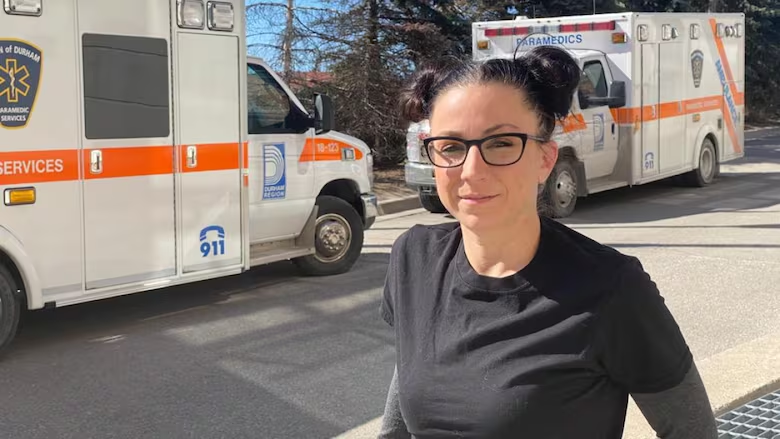Burnt out and underpaid, health-care workers hope Ontarians support them at election time
Poll suggests voters support health-care workers. Experts aren't sure they'll vote that way

Rose Mary Buote says she spends her shifts saying sorry — sorry a patient is so sick because a surgery was pushed back, sorry she left a patient's next of kin on hold, sorry she is stretched too thin to provide the care she wants to give.
"I feel so guilty," said Buote, a clerk who helps run the emergency department for Lakeridge Health Oshawa, a hospital in Durham Region east of Toronto.
"We don't even know what to tell patients, except, 'I'm sorry.' We're apologizing all the time."
Buote is just one of many health-care workers in Ontario who say they're cracking under the strain from understaffing and low pay. Some have left the profession during the pandemic — something Buote herself considered for the first time in her 15-year career.
As a provincial election looms, some health-care workers also say they are taking their concerns to the ballot box and will vote for a party that has a credible plan to improve health care and their working conditions. The results of a new Nanos poll, commissioned by the Ontario Council of Hospital Unions (OCHU), are giving them hope the general public will support those concerns on June 2 when the polls open.
Majority supports health-care workers, poll suggests
More than 81 per cent of Ontarians — and more than 82 per cent of those in the Greater Toronto Area — support or somewhat support increasing the pay of all hospital workers, due to their extra workload and their efforts during the pandemic, the Nanos poll suggests.
More than 89 per cent of Ontarians support or somewhat support increased mental health programs for hospital workers to help them deal with pandemic trauma.
Nanos surveyed of 2,553 Ontarians over 18. The respondents were drawn from an online panel between Feb. 4 and Feb. 8.
The OCHU says it commissioned the poll after hearing from its members that understaffing, low pay and health and safety conditions were causing workers to leave. The union heard other members were willing to see Ontario through the pandemic but weren't planning on sticking around beyond it, said Michael Hurley, president of the OCHU.
The council is hoping provincial politicians will see the Nanos poll results and address these matters during the election period, he says.

But for some health-care workers, those issues have already been ignored for too long.
Sonja Bernhard, a veteran registered practical nurse at St. Joseph's Healthcare in Hamilton, says she finally decided to switch from full-time to part-time after a patient assaulted a coworker.
She says while she hopes people will think of health-care workers at the polls in June, she has been alarmed by the erosion of support for her profession — adding that many of her colleagues are leaving because their wages are being capped while their workload has increased, vacation time has been denied and safety concerns have not been addressed.
Empathy may not equal votes
Meanwhile, experts say empathy for health-care workers is unlikely to drive most voters.
"The fact that there's a lot of things people agree with doesn't mean they're necessarily going to be the most important issue in society deciding how to vote," said Raisa Deber, a professor at the Institute of Health Policy, Management and Evaluation at the University of Toronto.
And wide public support for an issue doesn't always translate into a commitment from politicians, she says.

Ajay Sharma, who teaches political science at the University of Guelph, says he believes "pocketbook issues" will dominate at the ballot box, instead.
Even though voters might understand the plight of health-care workers more than they did before the pandemic, unless they're more directly affected by the system, the majority will vote based on another reason, and the politicians know that, he says.
For most people, "health care doesn't affect your pocketbook," he said, but the price of gas does.